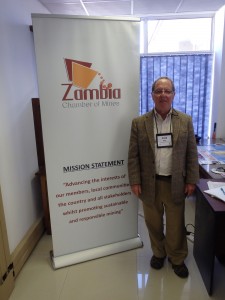Lusaka Airport
Copper May Be King, but Zambia is a Democracy

Yesterday we visited the Chamber of Mines, a lobbying group for the mining industry, and learned basically that the industry is troubled, despite its importance to the economy. It produces 68% of the country’s exports, 30% of its government revenue, 9% of GDP, almost 4% of investments, and 1.7 % of employment, according to industry figures. It’s had a turbulent past, having been nationalized at one point. Some of the problems are peculiar to Zambia, and align with what we’ve heard before: that landlocked Zambia has borders with 8 African countries (and the borders can produce long delays—it’s 6 weeks to and from Durban, making for high transportation costs; contrast with Chile, where nowhere is far from the Pacific). Some are endemic to industry in general; as a revenue producer, it’s susceptible to being targeted by politicians and the public for contributing more through taxation. There seems to be little government discussion with the mining industry; one of the executives pointed out that he learned about new taxes only by reading the newspaper. Taxes have also escalated. Furthermore,I don’t think mining has a good reputation anywhere (see the latest Grisham novel about West Virginia mines or read the newspapers about Chinese coal mine deaths, for example), and the aging mines here seem vulnerable to political pressure. When asked why, if conditions are so unfavorable here, there was no move to pull up and pull out, the answers ranged from, “We’ve got too much invested,” to a belief that in the long haul it’s possible, to some ego-based beliefs “we can do it.” The executives included some Zambians and a few foreigners, one of whom had been in the industry for 35 years, and I’d love to have questioned him about his experiences elsewhere. As I said, copper may be king, but Zambia is a democracy.
 We also visited the University of Lusaka, purportedly the 3rd best university in the country. It’s an unabashedly for-profit business that has returned 33% dividends to investors. Read backward from its $1000 per semester tuition, and you see a university with strict cost controls: 14 full time faculty and over 160 adjuncts and absolutely modest facilities. Its mission is “To fulfill the ever growing demand for employable human capital in various industries through continuous interaction with” etc., focusing on “tailor made programmes whilst equipping this human capital with cutting edge skills knowledge and information.” If offers doctoral programs in business, but “Other areas of specialization can be given consideration by the University Senate.” Its campus is spartan (the library had one shelf of business books, mostly texts, and two of law; the classrooms have whiteboards but no visible technology) but has almost 5000 students, mostly from Zambia and Zimbabwe. The University borrowed $200,000 to build the current campus, which it paid off in two years, a mark again of its efficiency.
We also visited the University of Lusaka, purportedly the 3rd best university in the country. It’s an unabashedly for-profit business that has returned 33% dividends to investors. Read backward from its $1000 per semester tuition, and you see a university with strict cost controls: 14 full time faculty and over 160 adjuncts and absolutely modest facilities. Its mission is “To fulfill the ever growing demand for employable human capital in various industries through continuous interaction with” etc., focusing on “tailor made programmes whilst equipping this human capital with cutting edge skills knowledge and information.” If offers doctoral programs in business, but “Other areas of specialization can be given consideration by the University Senate.” Its campus is spartan (the library had one shelf of business books, mostly texts, and two of law; the classrooms have whiteboards but no visible technology) but has almost 5000 students, mostly from Zambia and Zimbabwe. The University borrowed $200,000 to build the current campus, which it paid off in two years, a mark again of its efficiency.
As I said, it seems to fill a need in a country where—and I haven’t said this earlier—those living under the poverty line comprise 60% of the population.
On to Johannesburg.